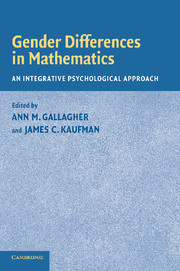Book contents
- Frontmatter
- Contents
- Preface
- Acknowledgments
- List of Contributors
- 1 Research on the Women and Mathematics Issue: A Personal Case History
- 2 The Perseverative Search for Sex Differences in Mathematics Ability
- 3 A Psychobiosocial Model: Why Females Are Sometimes Greater Than and Sometimes Less Than Males in Math Achievement
- 4 Gender Differences in Math: Cognitive Processes in an Expanded Framework
- 5 Cognitive Contributions to Sex Differences in Math Performance
- 6 Spatial Ability as a Mediator of Gender Differences on Mathematics Tests: A Biological–Environmental Framework
- 7 Examining Gender-Related Differential Item Functioning Using Insights from Psychometric and Multicontext Theory
- 8 The Gender-Gap Artifact: Women's Underperformance in Quantitative Domains Through the Lens of Stereotype Threat
- 9 “Math is hard!” (Barbie™, 1994): Responses of Threat vs. Challenge-Mediated Arousal to Stereotypes Alleging Intellectual Inferiority
- 10 The Role of Ethnicity on the Gender Gap in Mathematics
- 11 The Gender Gap in Mathematics: Merely a Step Function?
- 12 “I can, but I don't want to”: The Impact of Parents, Interests, and Activities on Gender Differences in Math
- 13 Gender Effects on Mathematics Achievement: Mediating Role of State and Trait Self-Regulation
- 14 Gender Differences in Mathematics Self-Efficacy Beliefs
- 15 Gender Differences in Mathematics: What We Know and What We Need to Know
- Author Index
- Subject Index
- References
12 - “I can, but I don't want to”: The Impact of Parents, Interests, and Activities on Gender Differences in Math
Published online by Cambridge University Press: 05 June 2012
- Frontmatter
- Contents
- Preface
- Acknowledgments
- List of Contributors
- 1 Research on the Women and Mathematics Issue: A Personal Case History
- 2 The Perseverative Search for Sex Differences in Mathematics Ability
- 3 A Psychobiosocial Model: Why Females Are Sometimes Greater Than and Sometimes Less Than Males in Math Achievement
- 4 Gender Differences in Math: Cognitive Processes in an Expanded Framework
- 5 Cognitive Contributions to Sex Differences in Math Performance
- 6 Spatial Ability as a Mediator of Gender Differences on Mathematics Tests: A Biological–Environmental Framework
- 7 Examining Gender-Related Differential Item Functioning Using Insights from Psychometric and Multicontext Theory
- 8 The Gender-Gap Artifact: Women's Underperformance in Quantitative Domains Through the Lens of Stereotype Threat
- 9 “Math is hard!” (Barbie™, 1994): Responses of Threat vs. Challenge-Mediated Arousal to Stereotypes Alleging Intellectual Inferiority
- 10 The Role of Ethnicity on the Gender Gap in Mathematics
- 11 The Gender Gap in Mathematics: Merely a Step Function?
- 12 “I can, but I don't want to”: The Impact of Parents, Interests, and Activities on Gender Differences in Math
- 13 Gender Effects on Mathematics Achievement: Mediating Role of State and Trait Self-Regulation
- 14 Gender Differences in Mathematics Self-Efficacy Beliefs
- 15 Gender Differences in Mathematics: What We Know and What We Need to Know
- Author Index
- Subject Index
- References
Summary
Although the mathematics performance gap between males and females has narrowed over the past decade (e.g., Hall, Davis, Bolen, & Chia; 1999; Hyde, 1997; National Center for Education Statistics [NCES], 2001), there continues to be a gulf between the number of women and men who pursue college degrees in engineering, physical sciences, computer sciences, and mathematics (Bae & Smith, 1996; Higher Education Research Institute, 1996; Stumpf & Stanley, 1996). Furthermore, women who hold bachelor's degrees in science and engineering are less likely than men with similar degrees to actually be employed in those fields; women constitute only 23% of the science and engineering labor force (National Science Foundation [NSF], 2000). The underrepresentation of women is especially evident in the physical sciences, where women comprise only 9% of employed engineers and 10% of employed physicists (NSF, 2000).
In light of diminishing performance differences, the continuing gender gap in math/science educational and career choices suggests that such choices are based on much more than achievement (Linver, Davis-Kean, & Eccles, 2002). Numerous theories dealing with competence, expectancy, and control beliefs provide explanations for performance on different kinds of achievement tasks; however, many of these theories do not systematically address another important motivational question: What makes the individual want to do math or science? Even if individuals feel competent, they may not want to pursue it.
- Type
- Chapter
- Information
- Gender Differences in MathematicsAn Integrative Psychological Approach, pp. 246 - 263Publisher: Cambridge University PressPrint publication year: 2004
References
- 12
- Cited by



